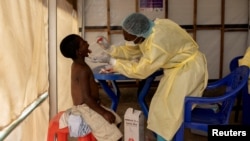World Health Organization chief Tedros Adhanom Ghebreyesus on Wednesday called an "emergency" meeting of international experts amidst growing worries over the mpox virus.
With mpox spreading outside of the Democratic Republic of Congo, Tedros said the WHO emergency committee would meet "as soon as possible" to advise him on "whether the outbreak represents a public health emergency of international concern."
A public health emergency of international concern is the highest alarm the WHO can sound and allows Tedros to trigger emergency responses under the International Health Regulations.
Formerly known as monkeypox, mpox is an infectious disease caused by a virus transmitted to humans by infected animals that can also be passed from human to human through close physical contact.
It was first discovered in humans in 1970 in DR Congo, causing fever, muscular aches and large boil-like skin lesions.
In May 2022, mpox infections surged worldwide, mostly affecting gay and bisexual men, due to the Clade IIb subclade.
The outbreak led the WHO to declare an international public health emergency (PHEIC), which lasted from July 2022 to May 2023. That outbreak has now largely subsided.
Since September 2023, a different strain of mpox, the Clade Ib subclade, has been surging in DR Congo.
On July 11, Tedros said more than 11,000 cases and 445 deaths had been reported in the giant African state this year, with children the most affected. The disease has since spread to neighboring countries.
A PHEIC has only been declared seven times since 2009: over H1N1 swine flu, poliovirus, Ebola, Zika virus, Ebola again, Covid-19 and mpox.




